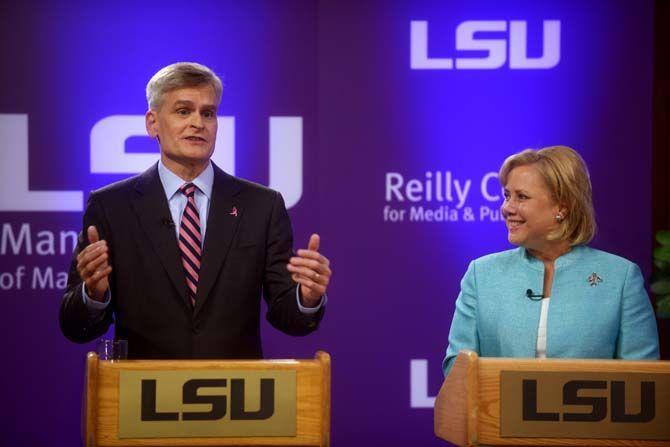Supporters of Rep. Bill Cassidy, R-La., Sen. Mary Landrieu, D-La., or Republican newcomer Rob Maness surrounded the steps of the Journalism Building at LSU last night for the final debate in the State’s U.S. Senate race.
Away from the mass of people in political T-shirts, Libertarian candidate Brannon McMorris and a handful of his supporters held up simple handmade signs in the median of the traffic circle across the street.
McMorris wasn’t invited to participate in the debate — an act that is symbolic of the limited exposure and separation third party candidates get.
Landrieu made a joke about Cassidy not participating in previous debates. Meanwhile, McMorris showed up to a debate he wasn’t invited to. None of the candidates who were in the debate even gave a direct answer to a question. The moderator asked them several times to stay on topic.
Mark Richard stood next to McMorris and held a neon poster with the message “Don’t Silence The Candidates” in bold black ink.
“Candidates with money get in, and money shouldn’t determine who is in a campaign,” Richard, a member of the Libertarian Party of St. Mary Parish, said. “The debate is held at LSU, which takes a lot of taxpayer’s dollars. By not allowing a third party candidate in, it’s the state shaping power and not the people.”
Sam Muffoletto of the organization GeauxLibertarian said the party fought hard to get ballot access, and it wasn’t fair to not be in the debate.
Debates are important in the U.S. political process because they allow more than one candidate to be present at a time; they aren’t scripted and draw a large number of viewers for a period of time.
However, only the perspectives of large party frontrunners are voiced, but recognized third party candidates like McMorris are often excluded and remain in the shadows. By limiting the number of candidates allowed to present their ideas, voters are not knowledgeable and don’t know the candidates on the ballot.
Since the first televised debate between Richard Nixon and John F. Kennedy in 1960, debates have become a useful opportunity for candidates and a deciding factor for voters. Because of this, more parties need to be represented so voters are informed. It’s wrong to walk up to a poll without knowing all the options.
McMorris said it’s detrimental to not hear another perspective at a debate, and the top candidates from recognized parties should all have a say.
“The public should hear more messages. It’s a focus on party service and not public service,” McMorris said.
Last night’s debate consisted of a Democrat and two Republicans. Voters are more diverse than just the ideologies of two political parties. Exposure to different candidates shouldn’t be a two-sided coin. The people deserve to know who is out there and what they stand for. A change like a Libertarian candidate at a debate could help end the current game of Democrat and Republican tug of war.
Austin Guidry, president of the Students for Sensible Drug Policy LSU chapter, was among those standing near McMorris.
“It’s expanding people and perspectives. It reduces government and promotes the right to choose and forge one’s own path. This is the true meaning of liberty,” Guidry said in regards to allowing more candidates into a debate.
The American people are diverse and differ greatly. If elected officials represent the people, then more sides need to be shown. This would incorporate more views and ideas, which would be beneficial. It also may lead more people to the polls on election day if they feel they have been fairly represented.
Justin Stafford is a 21-year-old mass communication senior from Walker, Louisiana. You can reach him on Twitter @ j_w_stafford.
Opinion: Politics consists of more than 2 parties
October 29, 2014
Bill Cassidy and Mary Landrieu face off in the last US senate candidate debate Wednesday October 29, 2014 in the Holliday Forum.





